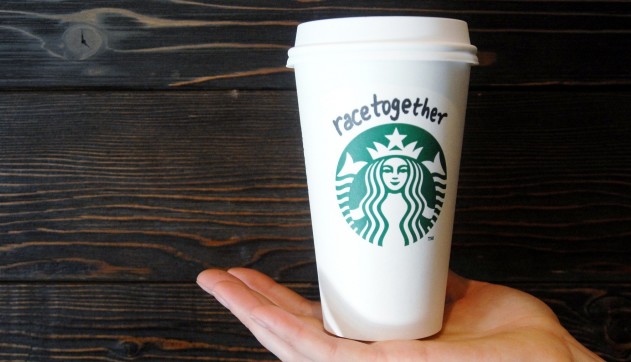It’s a risky business move, but Starbucks sees it as an ethical and moral imperative, which is respectable.
Earlier this week, Starbucks announced an initiative to start a conversation on race and racism in their stores. The idea is simple: Allow Starbucks workers the opportunity to initiate conversations with customers about race by writing the words “Race Together” on their cup. The decision to quite literally start conversations about race in coffee shops nationwide comes in the wake of months of protests and organizing around the police killings of unarmed African-American youths around the country.
Now, I’m probably one of the few black scholars who study race and racism who will say I completely support the spirit of what Starbucks wants to do.
The goal, after all, is to overcome racism. It’s a risky business move, but Starbucks sees it as an ethical and moral imperative, which is respectable. And after working in lots of spaces where I was the only African-American, I can appreciate a boss who opens up space for employees to talk openly about race and racism without fear of reprisal.
I am completely behind concrete policy-based proposals to fight racism, and I think that makes this a step in the right direction. But it still has plenty of flaws.
It appears that much of the Internet would agree with that. Starbucks CEO Howard Schultz might be confused about why this new initiative has been getting so much negative attention (so much so that Starbucks Senior Vice-President Corey DuBrowa shut down his Twitter account yesterday).
Truth is, those of us who study and analyze race in America understand that the blowback on these new Starbucks parlor chats are based on two things: 1) Most people in America are not informed enough to carry out meaningful discussions on race and racism 2) Most black people are forced to think and talk about race all the time, and are not necessarily in the mood for unwillingly being pulled into such conversations over their morning coffee (also, most people just want to get their coffee and go, and don’t want to chat up the person in the store on any subject).
White people in this country have no idea what it’s like to be black in this country. Just recently, I was up early worrying that a potential wedding venue away from the city might not let us book with them because we’re black. I watch shows like “House Hunters” in amazement that white folks can move anywhere in America without wondering how many other people of color might be around.
They don’t worry about whether their kids will be called “nigger,” or that a neighbor might hang a noose on their lawn, or that the man next door might kill their middle-schooler while he takes out the garbage. White folks don’t worry that a man might shoot their 8-year-old in the face while he happily celebrates his birthday by playing with new toys. They don’t avoid road trips on certain major highways for fear their car might break down and the person they ask for help will shoot them through the door.
What is that like? To be free?
We rarely get those moments. In truth, we often seek out the spaces where we can escape it, where we get to just simply exist. Sometimes that happens at church or at events filled with laughter and family. Sometimes you get a moment of freedom while holding your child in your arms and watching him breathe. And sometimes it happens nonchalantly in a coffee shop while you dream up your next book or catch up with a friend.
Black people don’t need reminders about race, we’re fluent in it.
But hopefully Starbucks has started a real conversation—not on race, but on how corporations and businesses can work to meaningfully combat structural racism and discrimination. (Ahem, Starbucks, that means we’re also waiting for you to discuss and change the lack of diversity at the executive level, too.) As the company has discovered, it’s difficult terrain to navigate. But, as they’ve already acknowledged, it’s well worth the pursuit.
Khadijah Costley White is an assistant professor in the Department of Journalism and Media Studies at Rutgers University in New Brunswick. Find her on Twitter here.
Related Links:

